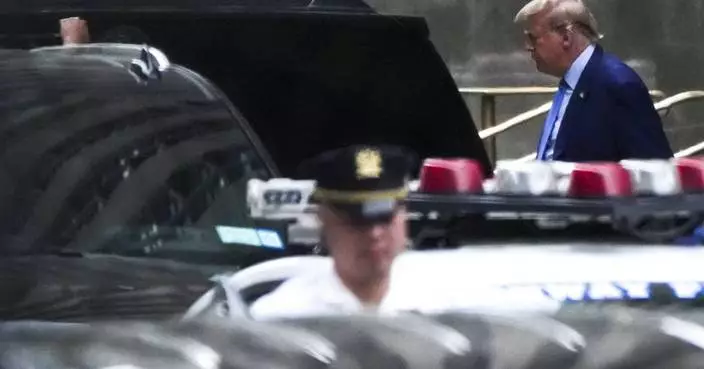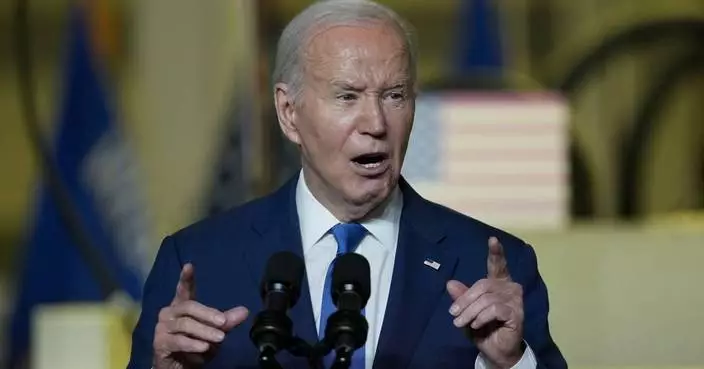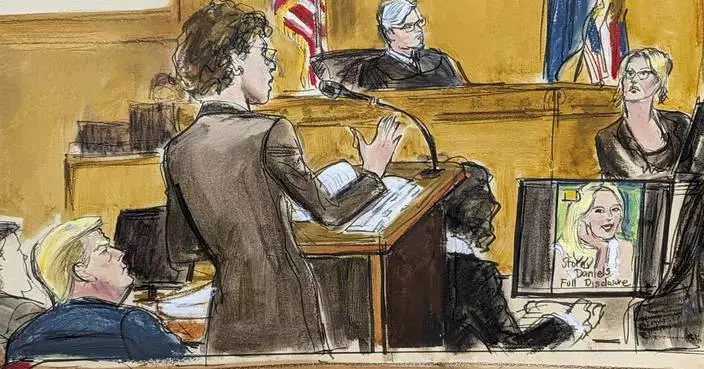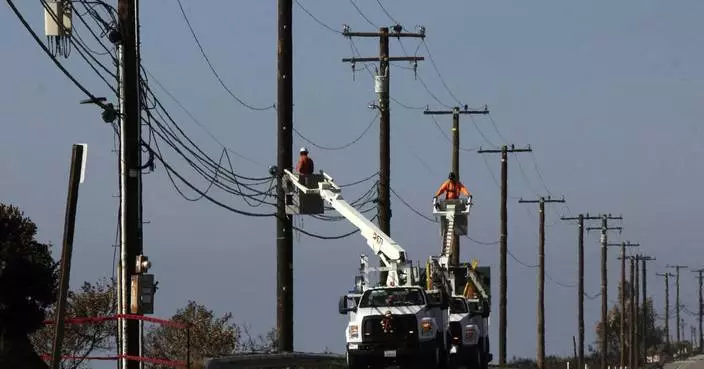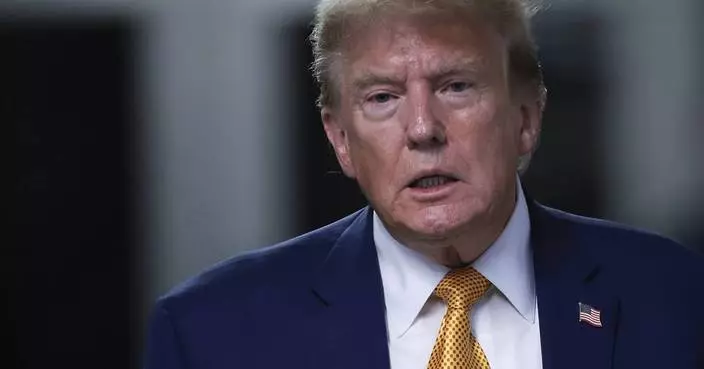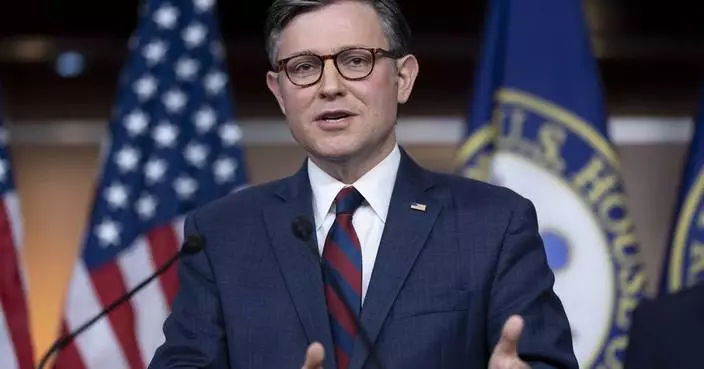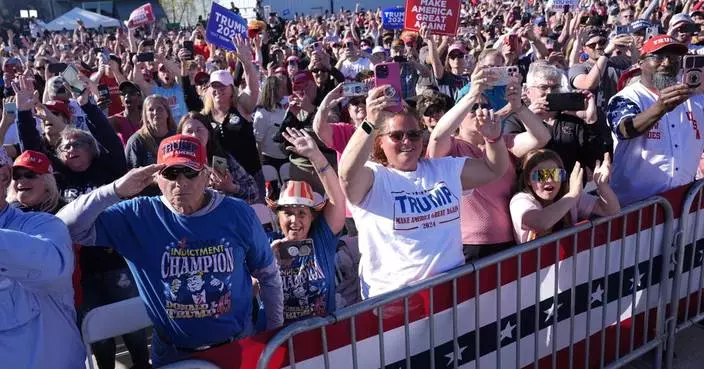President Donald Trump brought the world's two biggest economies to the brink of a trade war Friday by announcing a 25 percent tariff on up to $50 billion in Chinese imports to take effect July 6.
Beijing quickly responded that it would retaliate with penalties of the same scale on American goods — and it spelled out details to impose tariffs on 545 U.S. exports, including farm products, autos and seafood, according to the Xinhua state news agency.
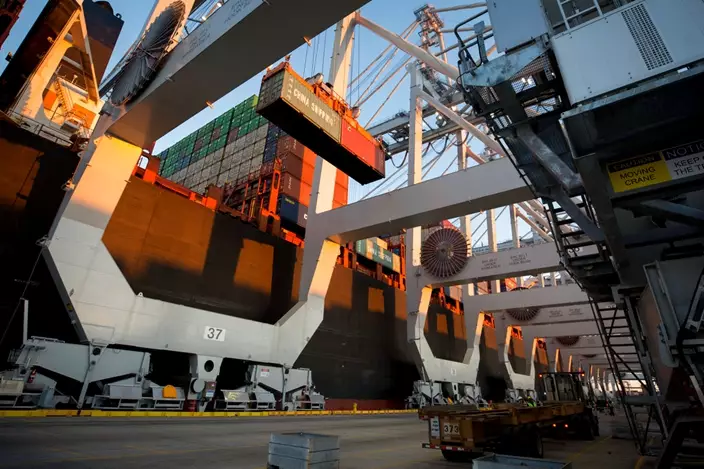
FILE- In this Jan. 30, 2018, file photo, a ship to shore crane loads two shipping containers together onto a vessel at the Georgia Ports Authority's Port of Savannah in Savannah, Ga. China's government renewed its threat Thursday, June 14, to scrap deals with Washington aimed at defusing a sprawling trade dispute as the White House prepared to release a list of Chinese goods targeted for tariff hikes. (AP Photo/Stephen B. Morton, File)
In announcing the U.S. tariffs, Trump said he was fulfilling a campaign pledge to crack down on what he contends are China's unfair trade practices and its efforts to undermine U.S. technology and intellectual property.
"We have the great brain power in Silicon Valley, and China and others steal those secrets," Trump said on "Fox & Friends." ''We're going to protect those secrets. Those are crown jewels for this country."
The prospect of a U.S.-China trade war weighed on financial markets Friday. The Dow Jones industrial average was down more than 220 points in mid-afternoon trading before recovering somewhat to finish down 84 points. Other stock averages also declined.
The U.S. tariffs will cover 1,102 Chinese product lines worth about $50 billion a year. Included are 818 items, worth $34 billion a year, from a list of 1,333 the administration had released in April. After receiving public comment, the U.S. removed 515 product lines from the list, including TVs and some pharmaceuticals, according to a senior administration official who briefed reporters on condition of anonymity.
The administration is targeting an additional 284 Chinese products, which it says benefit from Beijing's strong-armed industrial policies, worth $16 billion a year. But it won't impose those tariffs until it gathers public comments. U.S. companies that rely on the targeted imports — and can't find substitutes — can apply for exemptions from the tariffs.
The Trump administration has sought to protect consumers from a direct impact from the tariffs, which amount to a tax on imports. The tariffs target mainly Chinese industrial machinery, aerospace parts and communications technology, while sparing such consumer goods as smartphones, TVs, toys and clothes that Americans purchase by the truckload from China.
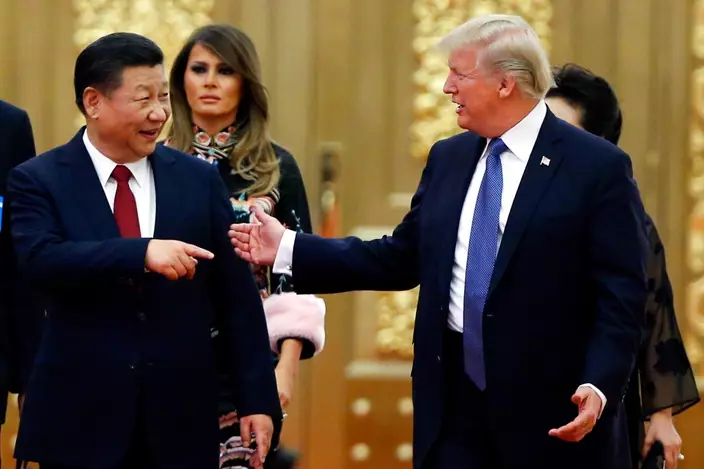
FILE - In this Nov. 9, 2017, file photo, U.S. President Donald Trump China's President Xi Jinping arrive for the state dinner with the first ladies at the Great Hall of the People in Beijing, China. Trump is closing in on a decision to impose punishing tariffs on tens of billions of dollars of Chinese goods as early as June 15, a move that could put his trade policies on a collision course with his push to rid the Korean Peninsula of nuclear weapons. Trump has long vowed to fulfill his campaign pledge to clamp down on what he considers unfair Chinese trading practices. But his calls for about $50 billion in tariffs could complicate his efforts to maintain China's support in his negotiations with North Korea. (Thomas Peter/Pool Photo via AP, File)
These tariffs will impose higher costs on U.S. companies that use the equipment. And over time, those costs could be passed on to consumers. But the impact won't be as visible as it would be if consumer products were taxed directly.
By contrast, the Trump administration earlier this year imposed steep tariffs on imported washing machines. By May, the cost of laundry equipment had jumped 17 percent from two months earlier, according to government data.
The administration characterized the tariffs it announced Friday as entirely proper.
"It's thorough, it's moderate, it's appropriate," U.S. Trade Rep. Robert Lighthizer said on Fox Business Network's "Mornings With Maria."
Lighthizer added, "Our hope is that it doesn't lead to a rash reaction from China."
But Beijing's Commerce Ministry retorted: "The Chinese side doesn't want to fight a trade war, but facing the shortsightedness of the U.S. side, China has to fight back strongly. We will immediately introduce the same scale and equal taxation measures, and all economic and trade achievements reached by the two sides will be invalidated."
A ministry statement gave no details of what U.S. goods would be hit by Beijing's retaliatory tariffs. But China in April had announced possible targets, including light aircraft, orange juice, whiskey, beef and soybeans — an economically and politically important export from America's heartland.
"The farmer can maybe look to their soybean associations for help to find other markets, but that doesn't happen immediately," said Dan Basse of AgResource, an agricultural research and advisory firm. "There's not much the farmer can do right now."
The longer-term concern, Basse said, is that China will increasingly look to Argentina and Brazil and that the United States will lose market share.
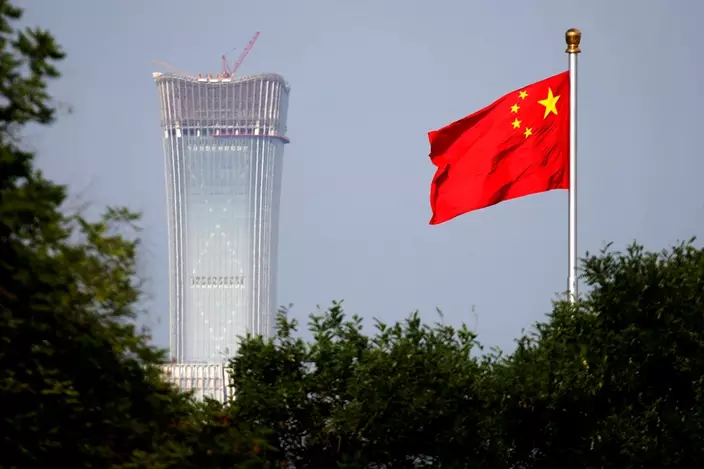
A Chinese national flag at Tiananmen Square flutters against the capital city tallest skyscraper China Zun Tower under construction at the Central Business District in Beijing Thursday, June 14, 2018. U.S. President Donald Trump approved a plan to impose punishing tariffs on tens of billions of dollars of Chinese goods as early as Friday, a move that could put his trade policies on a collision course with his push to rid the Korean Peninsula of nuclear weapons. (AP Photo/Andy Wong)
Trump has already imposed tariffs on steel and aluminum imports from Canada, Mexico and European allies, sparking anger and retaliatory threats from some of America's closest longtime allies. But his proposed tariffs against China risk igniting a damaging trade war involving the world's two biggest economies.
Trump's decision follows his summit with North Korean leader Kim Jong Un. The president has coordinated closely with China on efforts to pressure Pyongyang to eliminate its nuclear arsenal. But he signaled that whatever the implications for that or other issues, "I have to do what I have to do" to address China's trade policies.
By June 30, the administration is expected to finish writing rules to restrict China's ability to invest in U.S. technology.
Most of all, the U.S. tariffs are a response to China's attempts to supplant U.S. technological dominance, including outright theft of trade secrets and its requirement that U.S. companies share technology in exchange for access to the Chinese market.
The Trump administration has also argued that Beijing subsidies favored industries, encouraging them overinvest and overproduce. The result: China has flooded world markets in steel, aluminum, solar panels and products, thereby undercutting prices and putting foreign rivals out of business.
Wall Street has viewed the trade tensions with concern, fearful that they could strangle economic growth and undermine the benefits of the tax cuts Trump signed into law last year.
"Imposing tariffs places the cost of China's unfair trade practices squarely on the shoulders of American consumers, manufacturers, farmers, and ranchers," said Thomas Donohue, president of the U.S. Chamber of Commerce.
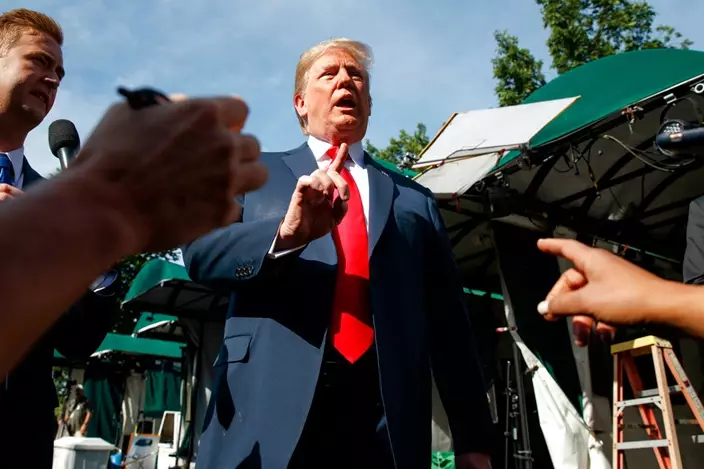
President Donald Trump speaks to reporters on the North Lawn of the White House, Friday, June 15, 2018, in Washington. (AP Photo/Evan Vucci)
Political reactions to Friday's announced tariffs cut across party lines. Senate Minority Leader Chuck Schumer, D-N.Y., said Trump was "right on target."
"China is our real trade enemy, and their theft of intellectual property and their refusal to let our companies compete fairly threatens millions of future American jobs," Schumer added.
But Rep. Dave Reichert, R-Wash., said he disagreed with the action because "Americans will bear the brunt instead of China."
NEW YORK (AP) — With Donald Trump’s fixer-turned-foe Michael Cohen expected to take the witness stand Monday, the judge in the former president’s hush money case issued prosecutors a stern warning: Get Cohen to stop his taunting posts and jabs at Trump.
Judge Juan M. Merchan's comments came as a dramatic and consequential week in the first criminal trial of a former American president drew to a close Friday. The prosecution could rest its case by the end of next week, prosecutor Joshua Steinglass said.
Prosecutors have been building up their case ahead of important testimony from Cohen, who arranged the $130,000 payout to porn actor Stormy Daniels to keep her from going public ahead of the 2016 election about an alleged sexual encounter with Trump a decade earlier. Trump denies ever having sex with Daniels.
The judge's warning underscores how Cohen is not only prosecutors' most crucial witness, but their most complicated. Once a Trump loyalist, he has become one of his fiercest critics since pleading guilty to federal charges, routinely bashing and mocking the former president on social media.
Defense attorneys will argue that the now-disbarred lawyer who served prison time is out to get Trump and cannot be believed.
Two people familiar with the matter told The Associated Press that Cohen is expected to take the stand Monday. The people could not discuss the matter publicly and spoke to AP on condition of anonymity.
Trump’s lawyers complained after Cohen in a social media video this week wore a shirt featuring a figure resembling the former president behind bars. The defense has argued it's unfair that Trump is under a gag order that prevents him from speaking publicly about witnesses while Cohen is free to speak badly about Trump.
“It’s becoming a problem every single day that President Trump is not allowed to respond to this witness, but this witness is allowed to continue to talk,” defense attorney Todd Blanche said.
Merchan told prosecutors they should inform Cohen “that the judge is asking him to refrain from making any more statements” about the case or about Trump. Prosecutors told the judge they already requested that Cohen and other witnesses not talk about the case, but they have no direct means of controlling witnesses' behavior.
Cohen did not immediately respond to a request for comment Friday from The Associated Press.
As the third week of testimony wrapped up, the case that ultimately hinges on record-keeping returned to deeply technical testimony — a sharp contrast from Daniels’ dramatic, if not downright seamy, account of the alleged sexual encounter with Trump that riveted jurors earlier this week.
Witnesses in the case have seesawed between bookkeepers and bankers with testimony about records and finances to Daniels and others with unflattering stories about Trump and the tabloid world machinations meant to keep them secret. Despite all the drama, in the end, the trial is about money changing hands — business transactions — and whether those payments were made to illegally influence the 2016 election.
Friday’s dry testimony appeared to test jurors’ patience at times. One juror stifled a yawn while another stretched out his arms. Others shifted their gaze around the room or stared up at the ceiling.
Trump, who was visibly angry during much of Daniels’ testimony, chatted frequently with his lawyers and read through a stack of papers on the table in front of him as jurors heard from witnesses such as AT&T and Verizon workers, who authenticated phone records.
Leaving the courthouse, Trump addressed the allegation at the heart of the case: that he falsified his company’s records to conceal the nature of hush money reimbursements to Cohen. Trump’s lawyers have portrayed the ledger entries at issue in the case as pro forma actions performed by a Trump Organization employee.
“A very good bookkeeper marked a legal expense as a legal expense,” Trump said. “He was a lawyer, not a fixer,” he added, referring to Cohen.
Back on the witness stand Friday morning was Madeleine Westerhout, a former Trump White House aide. Prosecutors used Westerhout's testimony to detail the process by which Trump got personal mail — including checks to sign — while in the White House. It’s relevant because that’s how he received and signed the checks that reimbursed Cohen for the payment to Daniels, prosecutors say.
While questioning Westerhout, Trump's attorney elicited testimony aimed at supporting the defense's argument that Daniels was paid to stay silent in order to protect Trump’s family, not his campaign.
Westerhout told jurors that Trump was “very upset” when The Wall Street Journal published a 2018 story about the hush money deal with Daniels.
“My understanding was that he knew it would be hurtful to his family,” Westerhout said, though she acknowledged she didn’t recall him saying so specifically.
Jurors also saw social media posts showing that Trump initially praised Cohen after the then-lawyer came under federal investigation. Trump started bashing him after Cohen pleaded guilty to campaign-finance violations, along with other crimes, and claimed Trump directed him to arrange the payment for Daniels. Trump was never charged with any crime related to that federal investigation.
Daniels’ story of an alleged sexual encounter with Trump was a crucial building block for prosecutors, who are seeking to show that the Republican and his allies buried unflattering stories in the waning weeks of the 2016 presidential election in an effort to illegally influence the race.
Over more than 7½ hours of testimony, Daniels relayed in graphic detail what she says happened after the two met at a 2006 celebrity golf outing at Lake Tahoe where sponsors included the adult film studio where she worked. Daniels explained how she felt surprise, fear and discomfort, even as she consented to sex with Trump.
During combative cross-examination, Trump's lawyers sought to paint Daniels as a liar and extortionist who’s trying to take down the former president after drawing money and fame from her claims.
After Daniels left the witness stand Thursday, Trump's attorneys pushed for a mistrial over the level of tawdry details she provided, but the judge denied the request.
This criminal case could be the only one of four against the presumptive Republican presidential nominee to go to trial before voters decide in November whether to send him back to the White House. Trump has pleaded not guilty and casts himself as the victim of a politically tainted justice system working to deny him another term.
Richer reported from Washington. Associated Press reporters Eric Tucker in Washington, Ruth Brown in New York and Adriana Gomez Licon in Miami contributed.
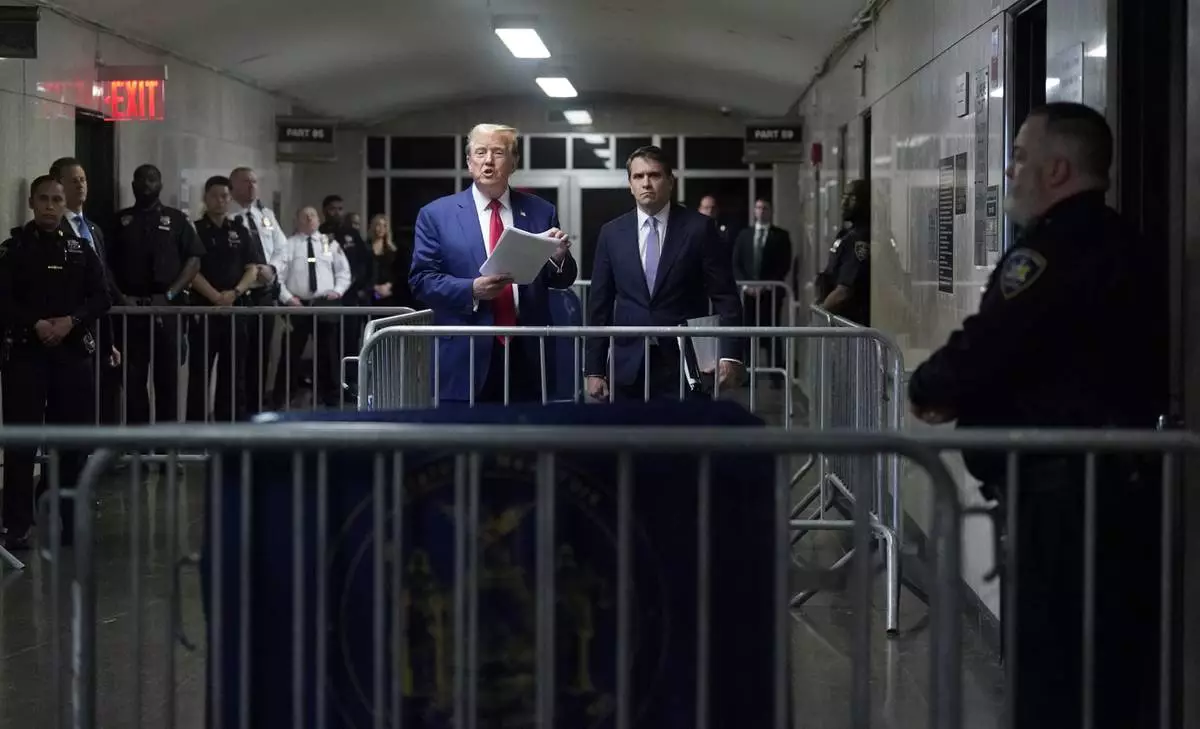
Former President Donald Trump, with attorney Todd Blanche, right, arrives at Manhattan criminal court in New York, on Friday, Friday, May 10, 2024. (Timothy A. Clary/Pool Photo via AP)
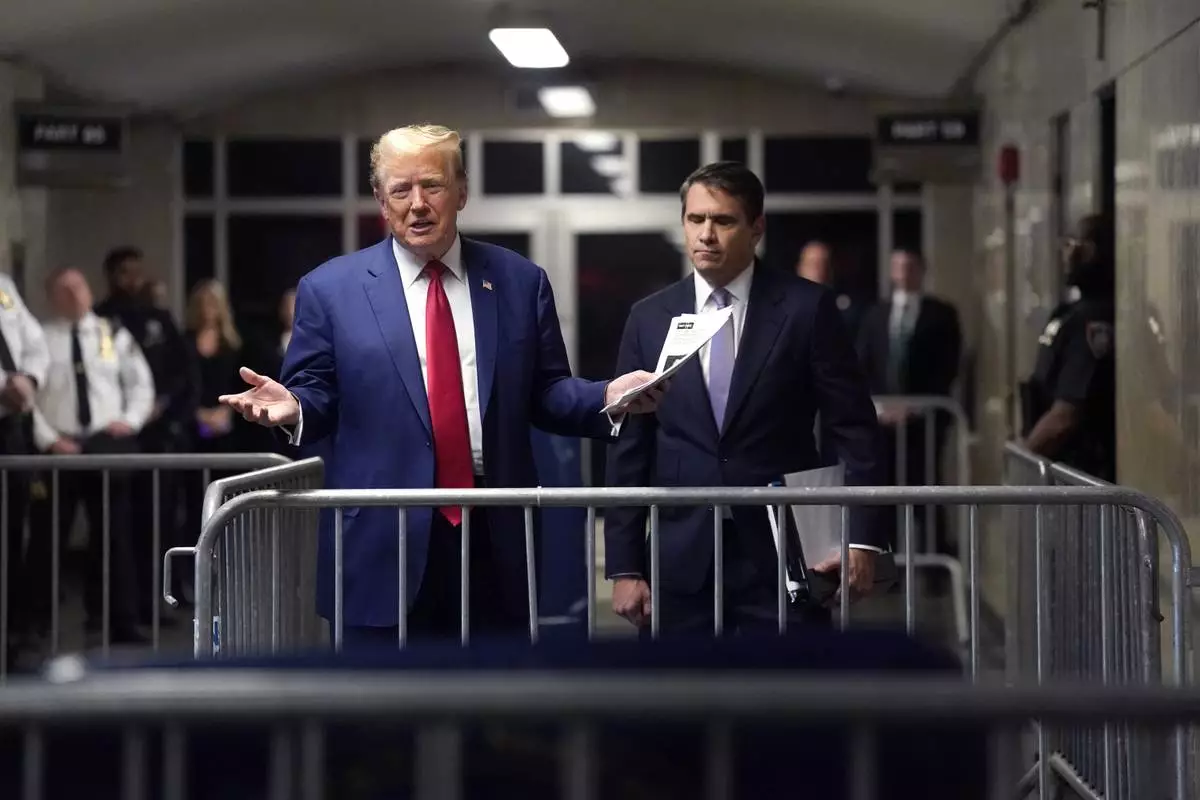
Former President Donald Trump, with attorney Todd Blanche, right, arrives at Manhattan criminal court in New York, on Friday, Friday, May 10, 2024. (Timothy A. Clary/Pool Photo via AP)
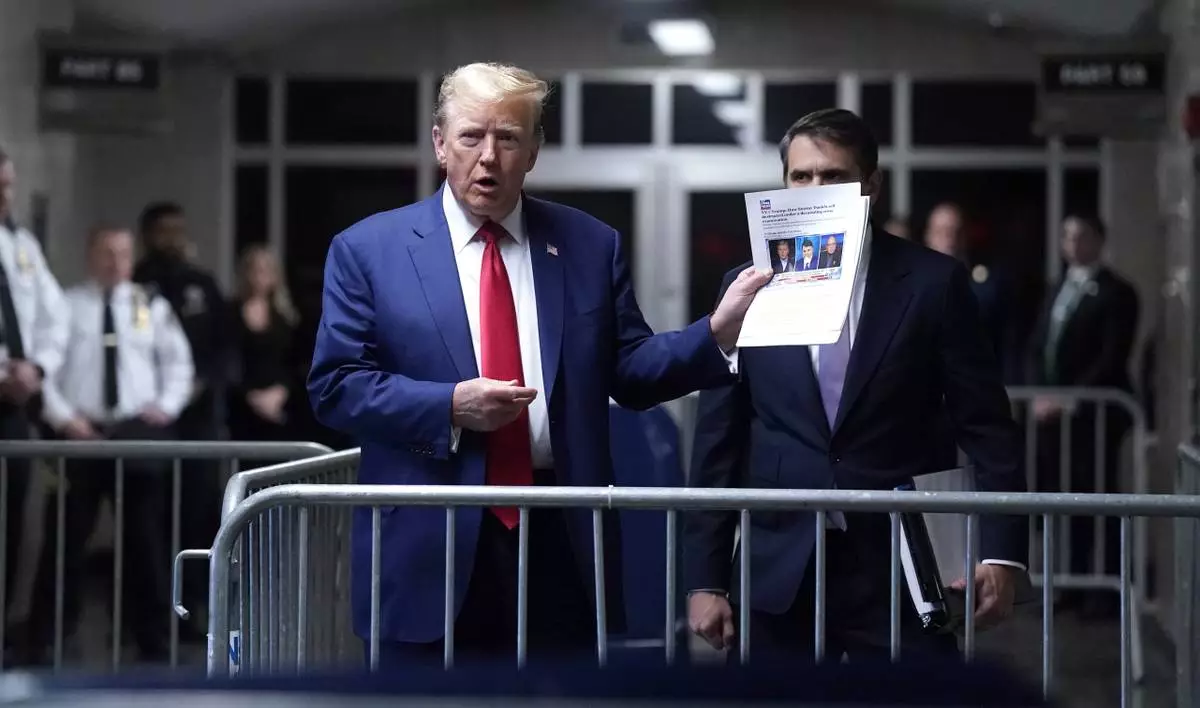
Former President Donald Trump, with attorney Todd Blanche, right, arrives at Manhattan criminal court in New York, on Friday, Friday, May 10, 2024. (Timothy A. Clary/Pool Photo via AP)
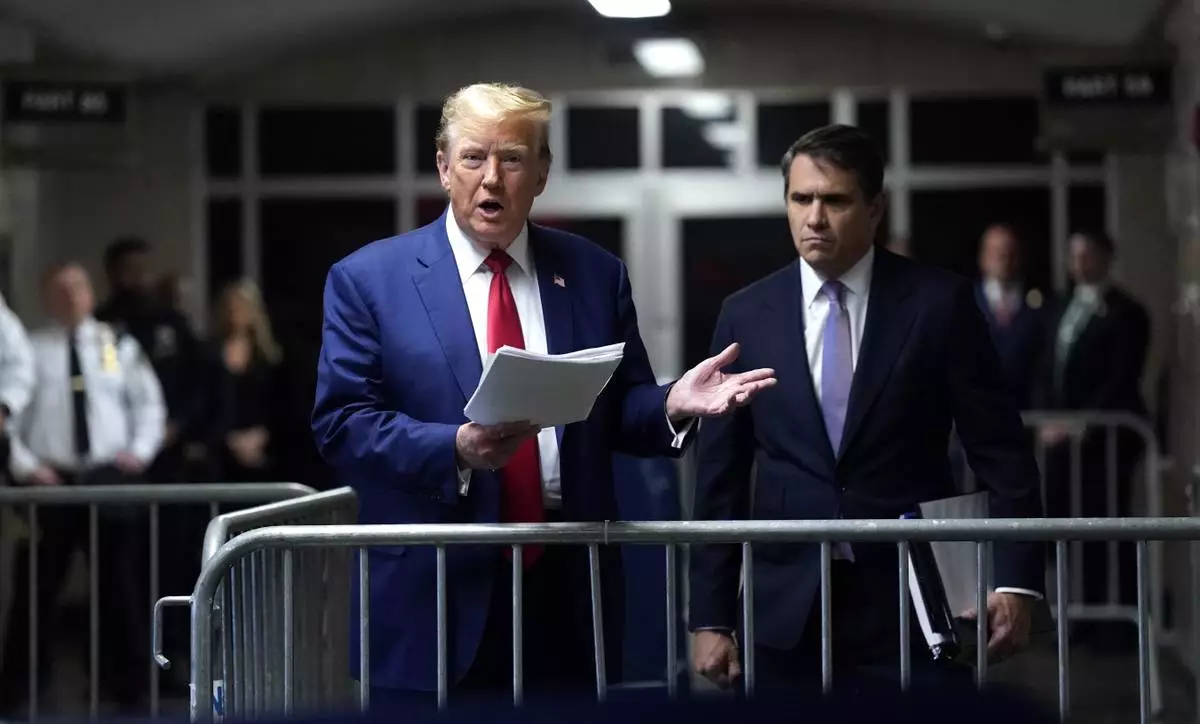
Former President Donald Trump, with attorney Todd Blanche, right, arrives at Manhattan criminal court in New York, on Friday, Friday, May 10, 2024. (Timothy A. Clary/Pool Photo via AP)
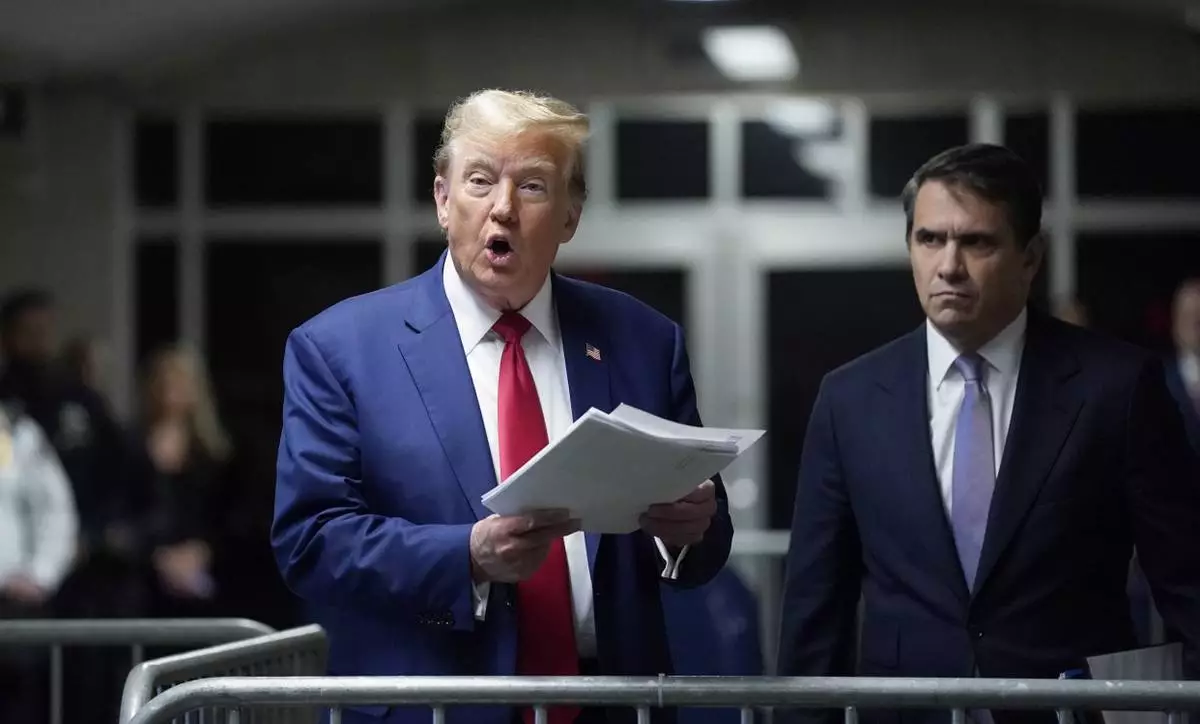
Former President Donald Trump, with attorney Todd Blanche, right, arrives at Manhattan criminal court in New York, on Friday, Friday, May 10, 2024. (Timothy A. Clary/Pool Photo via AP)
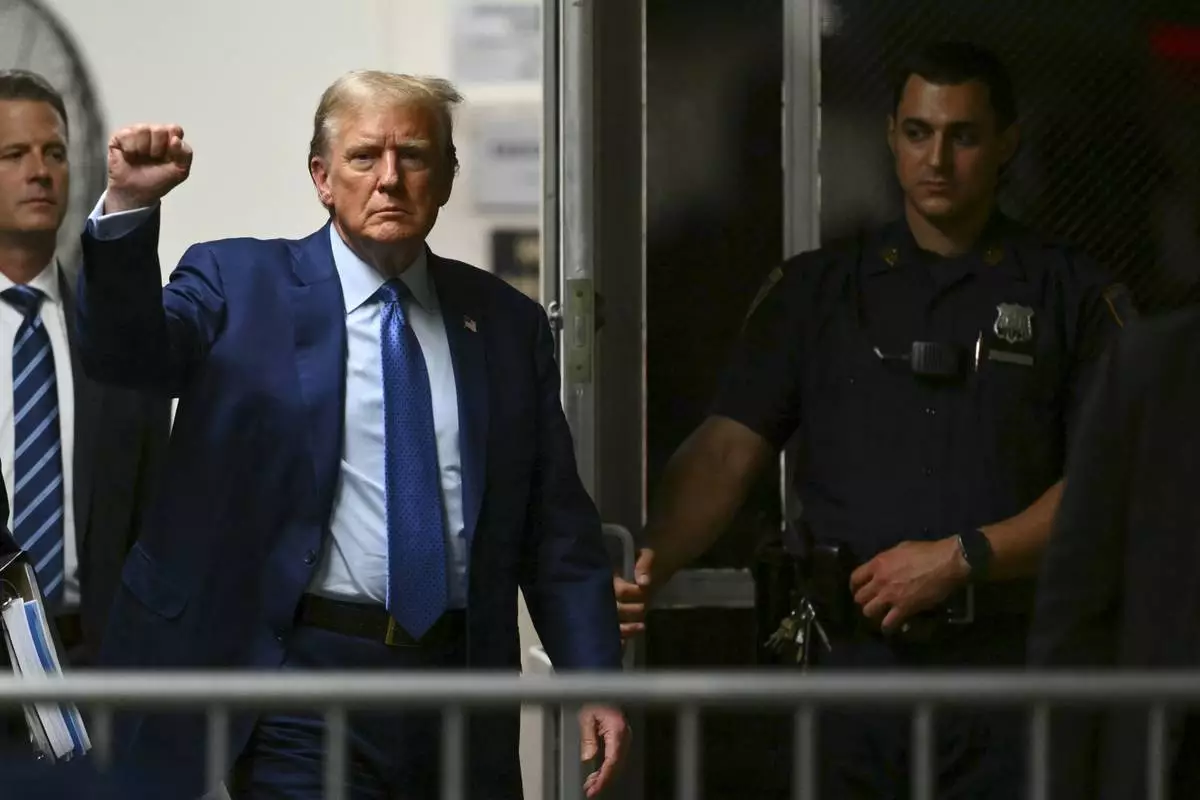
Former President Donald Trump gestures as he walks to the courtroom following a break in his trial at Manhattan criminal court Thursday, May 9, 2024, in New York. (Angela Weiss/Pool Photo via AP)
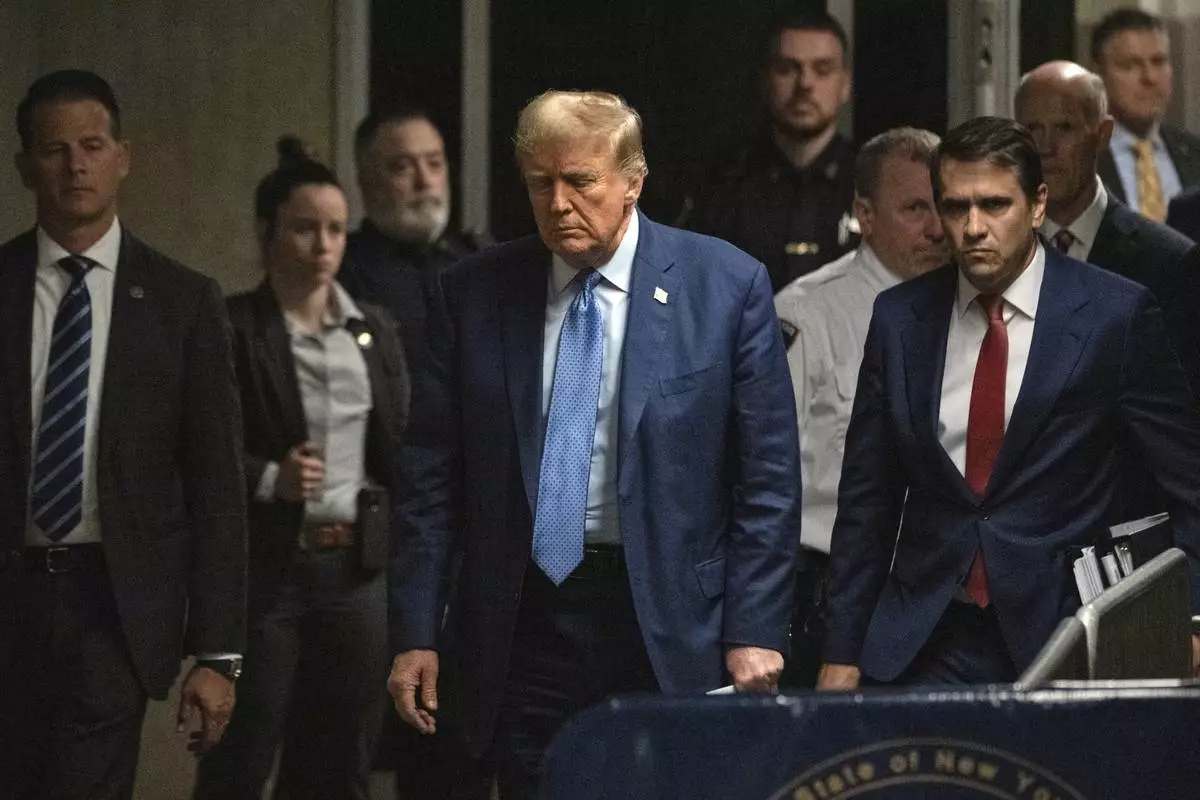
Former President Donald Trump, with his attorney Todd Blanch at his side, arrives for his trial at Manhattan Criminal Court, Thursday, May 9, 2024, in New York. (Victor J. Blue/The Washington Post via AP, Pool)
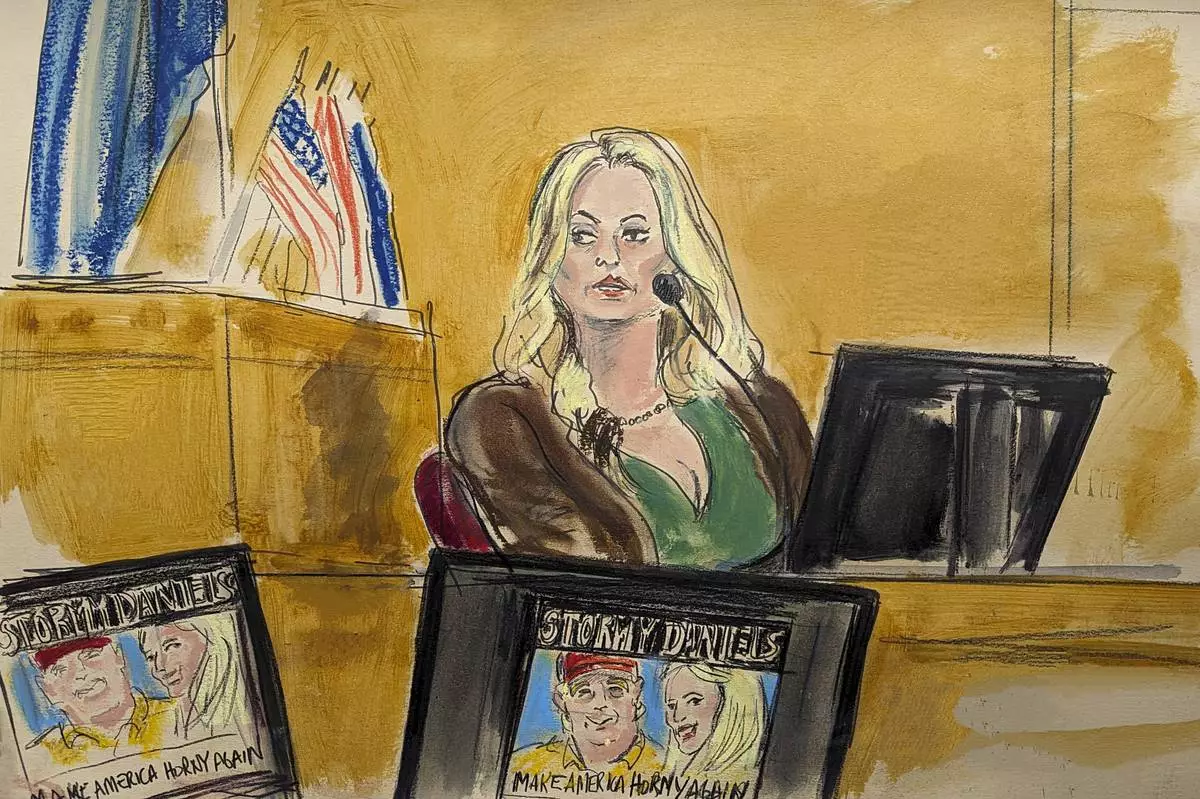
Stormy Daniels testifies on the witness stand as a promotional image for one of her shows featuring an image of Trump is displayed on monitors in Manhattan criminal court, Thursday, May 9, 2024, in New York. (Elizabeth Williams via AP)
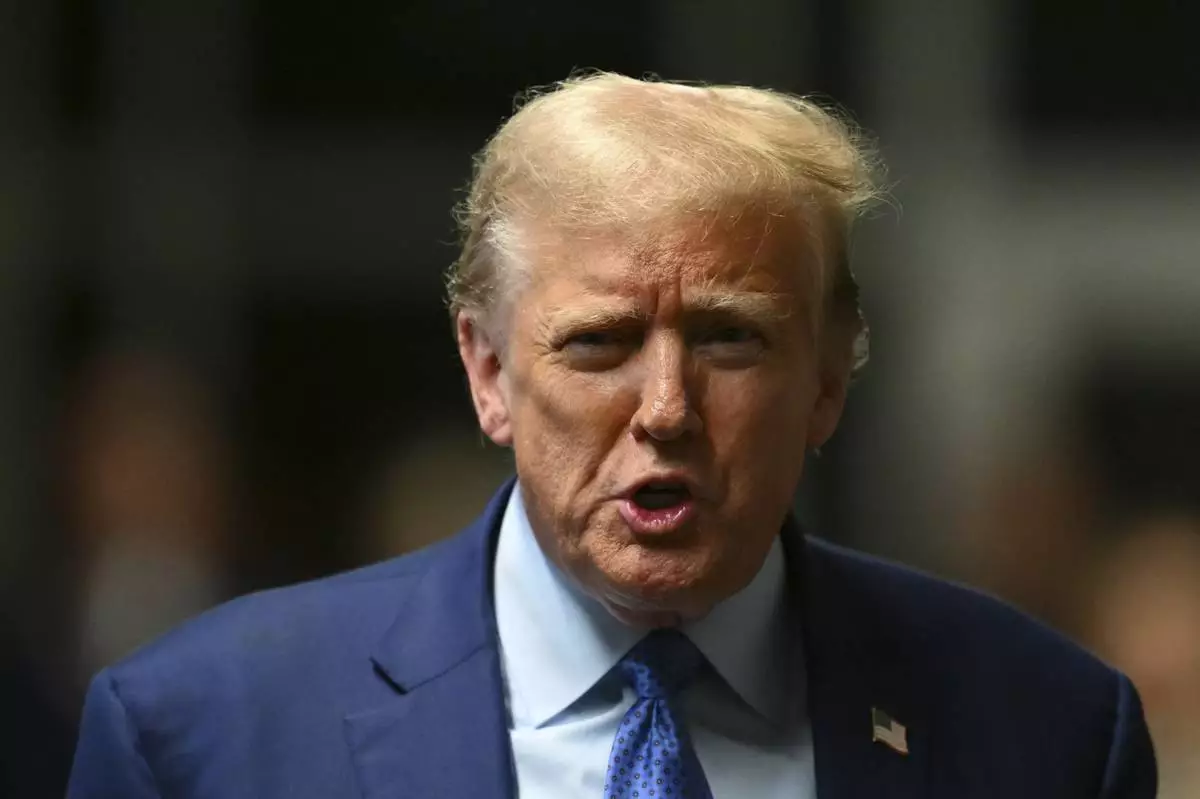
Former President Donald Trump speaks to the media at the end of the day of his hush money trial, in New York, Thursday, May 9, 2024. (Angela Weiss/Pool Photo via AP)
















